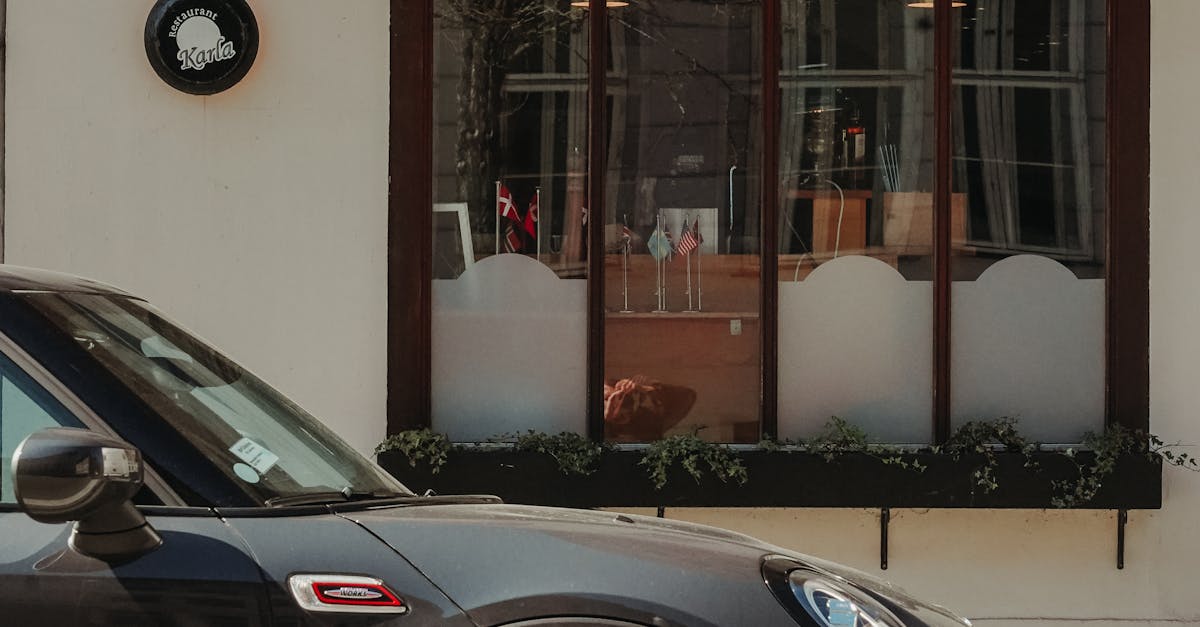
Signs That Indicate You Need a Rear Window Replacement
Table Of Contents
Difficulty in Opening or Closing Windows
Experiencing trouble when trying to open or close your rear windows can often signal deeper issues with the window’s mechanism. A window that is resistant to movement, whether it sticks or struggles to glide up and down, might indicate wear and tear. Components such as the window tracks or regulators may become damaged over time, leading to these frustrating difficulties.
Persistent issues with rear window operation can escalate into more severe problems if left unaddressed. Other factors, such as accumulated debris or faulty electrical systems, could also contribute to the malfunction. Regularly monitoring the ease of window operation is essential to ensure they function properly, promoting both convenience and safety while driving.
Stiff or Jammed Window Mechanism
A stiff or jammed rear window mechanism can significantly impair your vehicle’s functionality. When attempting to operate the window, you may experience unusual resistance or hear grinding noises. These signs often indicate that the window's components are worn out or misaligned. Regular use should allow for smooth operation, so challenges in this aspect should raise concern about potential underlying issues.
In some cases, the problem may stem from debris lodged in the window tracks or a lack of lubrication. However, if the window persists in being difficult to operate over time, it might be a more serious concern. Ignoring these signs could lead to complete window failure, compromising both convenience and security. Assessing the situation promptly is essential to avoid further complications and ensure your window operates reliably.
Increased Road Noise
Excessive road noise can indicate that your rear window is no longer providing the necessary seal. When the window doesn’t fit properly or the weatherstripping has worn down, external sounds can seep into the cabin. This distraction not only affects your driving comfort but may also hint at other underlying issues with your vehicle.
A significant increase in noise levels can compromise the overall driving experience. Sound insulation is vital for maintaining a peaceful interior, allowing you to better focus on the road ahead. If left unaddressed, this issue may lead to further degradation of the window and potentially other components of your car.
Sound Insulation Compromised
If you notice an increase in road noise while driving, it may indicate that your rear window's sound insulation has become compromised. This situation can arise from various factors, such as aging seals or damage to the glass itself. Any gaps or wear can allow external sounds to infiltrate the cabin, leading to an uncomfortable driving experience.
Moreover, a properly sealed rear window plays a crucial role in maintaining the overall cabin quietness. Compromised sound insulation not only detracts from comfort but can also increase fatigue during long journeys. Addressing these issues promptly is essential to ensure a pleasant and serene driving environment.
Safety Features Malfunctioning
Modern vehicles come equipped with a variety of safety features designed to enhance the driving experience and protect occupants. When the rear window becomes compromised, it can impact sensors that rely on clear visibility, such as parking assist and collision detection systems. A malfunction in these features can lead to increased risk when reversing or changing lanes.
Furthermore, a damaged rear window may interfere with the rear-view camera functionality. This can create significant blind spots and limit overall visibility while driving, heightening the probability of accidents. It's vital to address any issues with safety features promptly to ensure that the vehicle remains reliable and secure for all passengers.
Issues with Rear Camera or Sensors
Faulty rear windows can lead to malfunctions in integrated safety features such as cameras and sensors. When the visibility through the rear window is compromised, the camera may struggle to capture clear images. This loss of clarity not only affects driver convenience but also raises safety concerns while reversing or parking.
Additionally, sensors that rely on the rear window for proper functioning may also become unreliable. If the window's integrity is damaged, the sensor signals can be distorted or misinterpreted. These issues can result in warnings or alerts that fail to activate when necessary, potentially putting the driver and others at risk.
FAQS
How can I tell if my rear window needs to be replaced?
Common signs include difficulty in opening or closing the window, increased road noise, and malfunctioning safety features like rear cameras or sensors.
What should I do if my rear window mechanism is stiff or jammed?
If the window mechanism is stiff or jammed, it's advisable to have it inspected by a professional to determine if a replacement is necessary or if it can be repaired.
Can increased road noise indicate a rear window issue?
Yes, increased road noise can suggest that the seal around the rear window is compromised, which may require a replacement to restore proper sound insulation.
Are there any safety features that could malfunction due to a faulty rear window?
Yes, safety features like rear-facing cameras or sensors can malfunction if the rear window is damaged or improperly sealed, impacting visibility and safety while driving.
Is it possible to repair a damaged rear window instead of replacing it?
In some cases, minor damage may be repairable, but if the damage affects the window's integrity or functionality, a full replacement is often the better option.
Related Links
Benefits of Professional Rear Window Replacement ServicesComparing Rear Window Replacement Options for Different Car Models
Frequently Asked Questions About Rear Window Replacement
Tips for Maintaining Your Newly Replaced Rear Window
The Role of Technology in Modern Rear Window Replacement
How to Choose the Right Rear Window Glass for Your Vehicle
Understanding the Importance of Rear Window Replacement in Sydney
Common Issues Resulting in Rear Window Damage